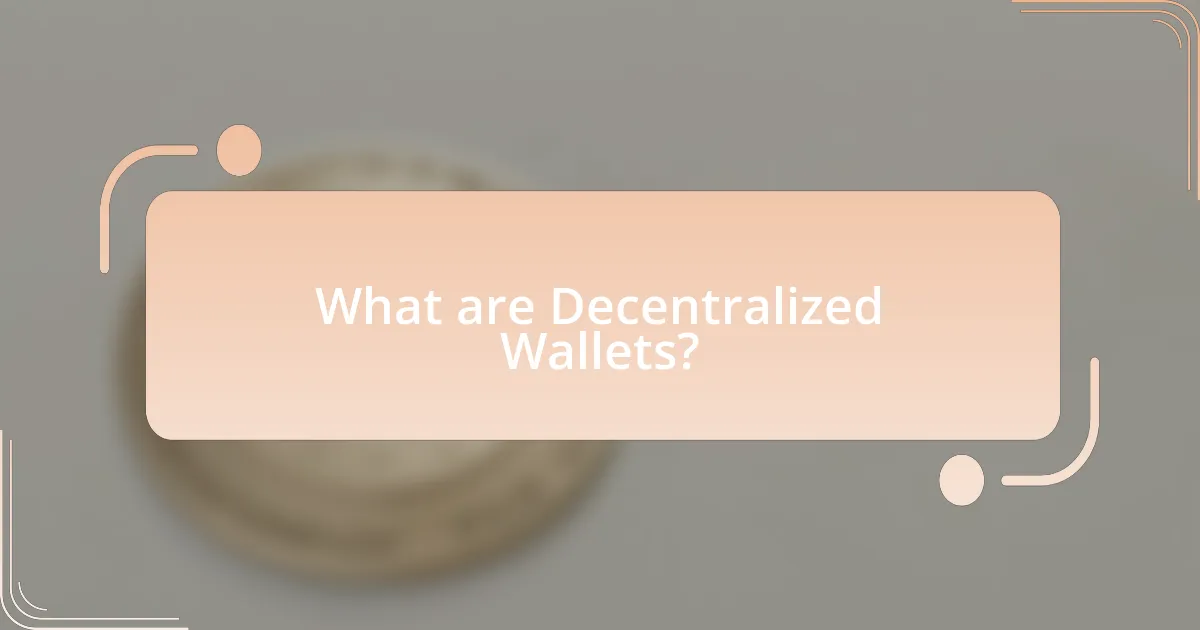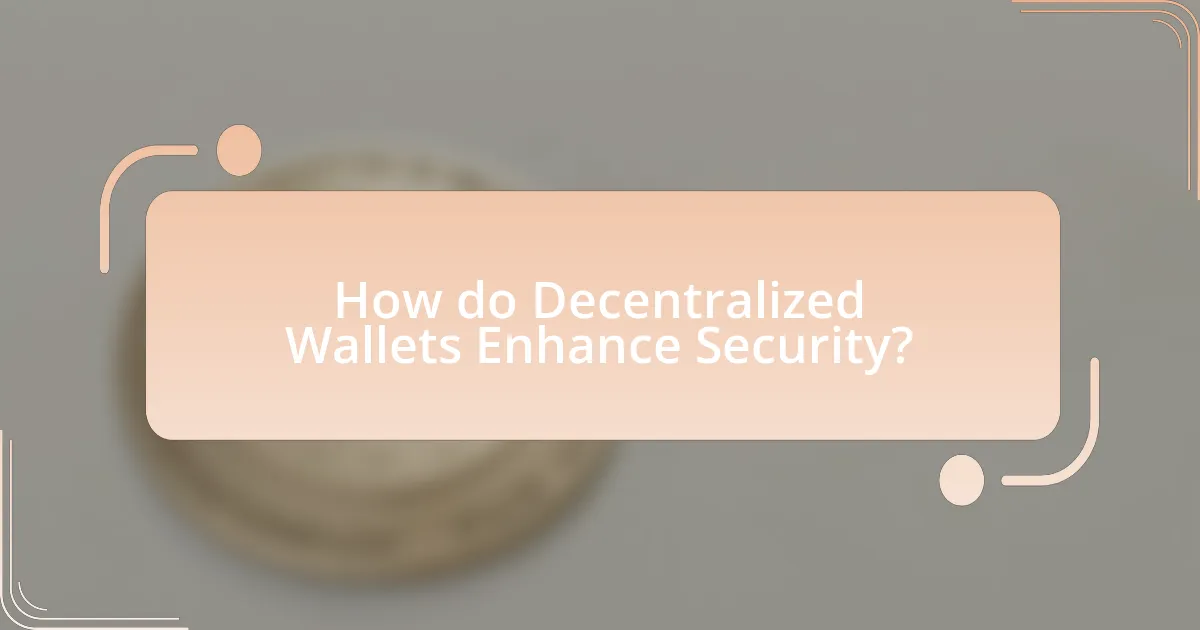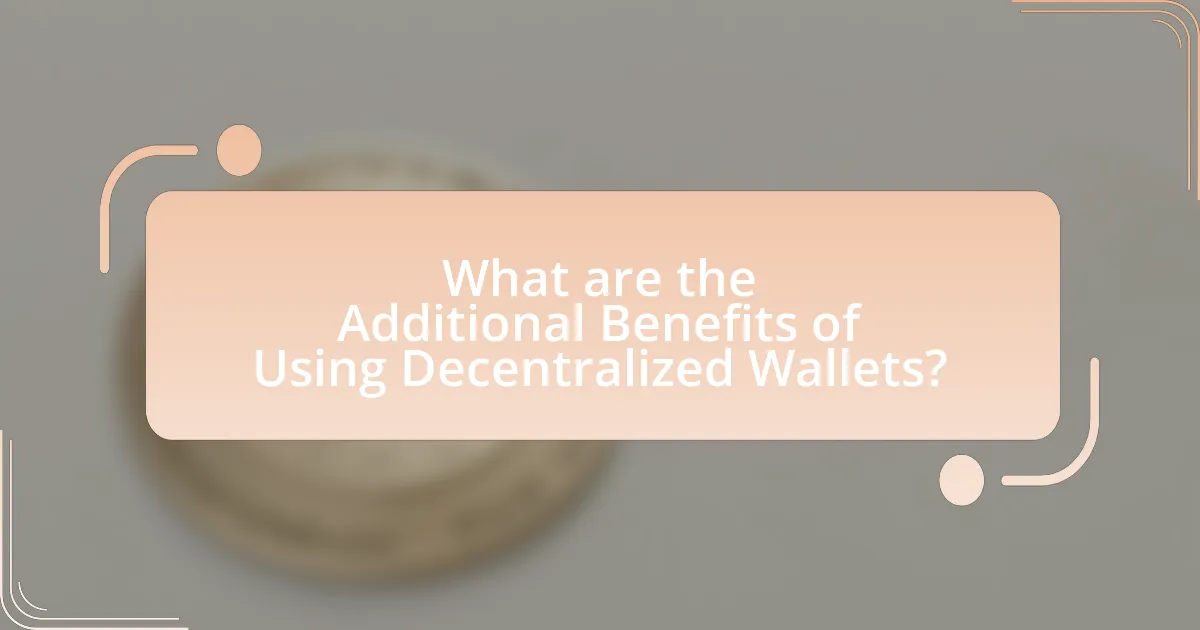Decentralized wallets are digital tools that enable users to store and manage cryptocurrencies without relying on a central authority, enhancing security and control over private keys. This article explores the differences between decentralized and traditional wallets, highlighting the key features and types of decentralized wallets, including software, hardware, and paper wallets. It discusses the importance of decentralization for security, the risks associated with traditional wallets, and how decentralized wallets mitigate these risks through user control and advanced security measures. Additionally, the article examines the benefits of using decentralized wallets, such as enhanced privacy, lower transaction fees, and best practices for securing private keys.

What are Decentralized Wallets?
Decentralized wallets are digital wallets that allow users to store and manage their cryptocurrencies without relying on a central authority or intermediary. These wallets operate on blockchain technology, enabling users to have full control over their private keys and funds, which enhances security by reducing the risk of hacks or fraud associated with centralized exchanges. According to a report by Chainalysis, decentralized finance (DeFi) platforms, which often utilize decentralized wallets, have seen significant growth, indicating a rising trust in their security features.
How do decentralized wallets differ from traditional wallets?
Decentralized wallets differ from traditional wallets primarily in their control over private keys and user data. In decentralized wallets, users maintain full control of their private keys, which enhances security and reduces the risk of hacks associated with centralized storage. Traditional wallets, often managed by third-party services, require users to trust these entities with their private keys, making them vulnerable to breaches. For instance, in 2021, a significant number of cryptocurrency thefts were linked to centralized exchanges, highlighting the risks of traditional wallet systems.
What are the key features of decentralized wallets?
Decentralized wallets are characterized by key features that enhance user control and security. Firstly, they allow users to maintain full ownership of their private keys, which means that only the user has access to their funds, reducing the risk of hacks associated with centralized storage. Secondly, decentralized wallets operate on blockchain technology, ensuring transparency and immutability of transactions, which adds an additional layer of security. Thirdly, they often support multiple cryptocurrencies, providing flexibility for users to manage various digital assets in one place. Lastly, decentralized wallets typically do not require personal information for setup, enhancing user privacy and reducing the risk of identity theft. These features collectively contribute to a more secure and user-centric approach to managing digital assets.
Why is decentralization important for wallet security?
Decentralization is crucial for wallet security because it reduces the risk of a single point of failure. In a decentralized system, user data and assets are distributed across multiple nodes, making it significantly harder for hackers to compromise the entire network. For instance, traditional centralized wallets store private keys on a single server, which can be targeted and breached, leading to potential loss of funds. In contrast, decentralized wallets utilize blockchain technology, where transactions are verified by a network of nodes, enhancing security through redundancy and transparency. This distributed nature ensures that even if one node is attacked, the overall integrity of the wallet remains intact, thereby safeguarding user assets.
What types of decentralized wallets are available?
There are three main types of decentralized wallets available: software wallets, hardware wallets, and paper wallets. Software wallets, which include desktop and mobile applications, allow users to manage their cryptocurrencies directly on their devices. Hardware wallets are physical devices that store private keys offline, providing enhanced security against online threats. Paper wallets involve printing out the private and public keys on paper, ensuring that the keys are stored completely offline. Each type offers unique security features, catering to different user preferences and risk tolerances.
What are software wallets and how do they function?
Software wallets are digital applications that allow users to store, send, and receive cryptocurrencies. They function by generating and managing private and public keys, which are essential for executing transactions on a blockchain. When a user initiates a transaction, the software wallet uses the private key to sign it, ensuring that only the owner can authorize the transfer of funds. Additionally, software wallets can connect to the internet, enabling real-time access to cryptocurrency networks, which facilitates quick transactions. The security of software wallets can vary, with some offering features like two-factor authentication and encryption to protect user data and funds.
What are hardware wallets and what advantages do they offer?
Hardware wallets are physical devices designed to securely store cryptocurrency private keys offline. The primary advantage of hardware wallets is their enhanced security; they protect against online threats such as hacking and malware by keeping private keys isolated from internet-connected devices. According to a report by the European Union Agency for Cybersecurity, hardware wallets significantly reduce the risk of unauthorized access, making them a preferred choice for long-term cryptocurrency storage.

How do Decentralized Wallets Enhance Security?
Decentralized wallets enhance security by allowing users to maintain control over their private keys, which are essential for accessing and managing their cryptocurrency. Unlike centralized wallets, where private keys are stored on a server controlled by a third party, decentralized wallets store keys locally on the user’s device. This reduces the risk of hacks and unauthorized access, as there is no central point of failure. According to a report by CipherTrace, in 2020, over $1.8 billion was lost in cryptocurrency thefts, primarily from centralized exchanges, highlighting the vulnerabilities associated with centralized storage. By using decentralized wallets, users can significantly mitigate these risks and enhance the overall security of their digital assets.
What security risks do traditional wallets face?
Traditional wallets face several security risks, including theft, loss, and fraud. These wallets, often physical or centralized digital forms, can be easily stolen or lost, leading to the permanent loss of funds. Additionally, traditional wallets are susceptible to hacking, especially those connected to the internet, where cybercriminals exploit vulnerabilities to access sensitive information. According to a report by the Federal Trade Commission, in 2021, consumers reported losing over $1.6 billion to fraud, much of which involved traditional wallet systems. This data underscores the significant risks associated with traditional wallets, highlighting the need for more secure alternatives like decentralized wallets.
How do centralized exchanges expose users to security threats?
Centralized exchanges expose users to security threats primarily through their centralized control over user funds and data, making them attractive targets for hackers. These platforms often hold large amounts of cryptocurrency in hot wallets, which are connected to the internet, increasing vulnerability to cyberattacks. For instance, in 2014, Mt. Gox, a centralized exchange, was hacked, resulting in the loss of approximately 850,000 Bitcoins, highlighting the risks associated with centralized storage. Additionally, centralized exchanges may lack robust security measures, such as two-factor authentication or cold storage, further compromising user safety. The reliance on a single entity for transaction processing also creates risks of insider threats and operational failures, which can lead to significant financial losses for users.
What vulnerabilities exist in traditional banking systems?
Traditional banking systems are vulnerable to several key issues, including cyberattacks, insider threats, and systemic risks. Cyberattacks, such as data breaches and ransomware, have increased significantly, with the 2021 IBM Cost of a Data Breach Report indicating that the average cost of a data breach in the financial sector is $5.72 million. Insider threats arise from employees misusing their access to sensitive information, which can lead to fraud or data leaks. Additionally, systemic risks, highlighted during the 2008 financial crisis, demonstrate how interconnectedness among banks can lead to widespread failures, affecting the entire financial system. These vulnerabilities underscore the need for enhanced security measures, such as those offered by decentralized wallets.
How do decentralized wallets mitigate these risks?
Decentralized wallets mitigate risks by eliminating the need for a central authority to manage private keys and funds, thereby reducing the likelihood of hacks and fraud. In a decentralized wallet, users retain full control over their private keys, which are stored locally rather than on a centralized server, making it significantly harder for attackers to access funds. Additionally, decentralized wallets often employ advanced cryptographic techniques, such as multi-signature authentication, which requires multiple approvals for transactions, further enhancing security. This structure has been validated by the increasing adoption of decentralized finance (DeFi) platforms, which have seen a rise in user trust due to their inherent security features compared to traditional centralized systems.
What role does private key management play in security?
Private key management is crucial for security as it ensures that only authorized users can access and control their digital assets. Effective management of private keys prevents unauthorized access, theft, and loss of cryptocurrencies or sensitive information. According to a report by the Blockchain Security Alliance, 98% of cryptocurrency thefts are due to poor private key management practices. This statistic underscores the importance of securely storing, backing up, and managing private keys to maintain the integrity and security of digital assets.
How does user control over funds enhance security?
User control over funds enhances security by minimizing the risk of unauthorized access and fraud. When individuals manage their own funds through decentralized wallets, they retain full ownership and control, eliminating reliance on third-party institutions that may be vulnerable to breaches. For instance, a study by the Cambridge Centre for Alternative Finance found that decentralized wallets significantly reduce the likelihood of hacking incidents compared to centralized exchanges, where user funds are pooled and thus more attractive targets for cybercriminals. This direct control allows users to implement personal security measures, such as strong passwords and two-factor authentication, further safeguarding their assets.

What are the Additional Benefits of Using Decentralized Wallets?
Decentralized wallets offer enhanced privacy, control over funds, and reduced reliance on third parties. Users maintain full ownership of their private keys, which minimizes the risk of hacks associated with centralized exchanges. Additionally, decentralized wallets often support a wider range of cryptocurrencies, allowing for greater flexibility in asset management. According to a report by Chainalysis, decentralized finance (DeFi) platforms have seen significant growth, indicating a shift towards user-controlled financial solutions. This trend underscores the increasing recognition of the benefits associated with decentralized wallets.
How do decentralized wallets promote user privacy?
Decentralized wallets promote user privacy by allowing individuals to control their private keys and personal data without relying on third-party intermediaries. This control minimizes the risk of data breaches and unauthorized access, as users are not required to share sensitive information with centralized entities. Furthermore, decentralized wallets often utilize blockchain technology, which inherently provides anonymity through pseudonymous addresses, making it difficult to trace transactions back to individual users. Studies have shown that decentralized systems reduce the likelihood of surveillance and data collection, thereby enhancing user privacy in financial transactions.
What measures do decentralized wallets take to protect user data?
Decentralized wallets protect user data through encryption, private key management, and user-controlled data storage. These wallets utilize strong cryptographic algorithms to encrypt sensitive information, ensuring that only the user can access their data. Additionally, decentralized wallets do not store user data on centralized servers, which reduces the risk of data breaches. Instead, they allow users to maintain control over their private keys, meaning that users are solely responsible for their security. This approach minimizes the risk of unauthorized access and enhances overall data protection.
How does anonymity in transactions benefit users?
Anonymity in transactions benefits users by protecting their personal information and financial data from unauthorized access and surveillance. This protection reduces the risk of identity theft and fraud, as sensitive details are not linked to the user’s identity. For instance, a study by the Electronic Frontier Foundation highlights that anonymity can prevent third parties from tracking spending habits, thereby enhancing privacy and security in financial dealings. Additionally, users can engage in transactions without fear of discrimination or bias, as their identity remains concealed.
What are the cost benefits of decentralized wallets?
Decentralized wallets offer significant cost benefits primarily through reduced transaction fees and enhanced control over funds. Users of decentralized wallets typically incur lower fees compared to traditional banking systems and centralized exchanges, as they eliminate intermediaries and associated costs. For instance, transactions on decentralized platforms often have minimal fees, sometimes as low as a fraction of a cent, compared to the higher fees charged by banks and centralized services, which can range from 1% to 5% per transaction. Additionally, decentralized wallets empower users to manage their own private keys, reducing the risk of loss due to third-party failures or hacks, which can lead to substantial financial losses. This self-custody model not only saves costs associated with recovery services but also enhances overall financial security.
How do transaction fees compare to traditional wallets?
Transaction fees for decentralized wallets are generally lower than those for traditional wallets. Traditional wallets, particularly those associated with banks or payment processors, often impose higher fees for transactions due to intermediary costs and processing fees. In contrast, decentralized wallets leverage blockchain technology, which can significantly reduce transaction costs by eliminating intermediaries. For example, Bitcoin transaction fees can vary but are often lower than the fees charged by banks for wire transfers, which can range from $15 to $50 per transaction. This cost efficiency makes decentralized wallets an attractive option for users seeking to minimize transaction expenses.
What are the long-term financial advantages of using decentralized wallets?
Decentralized wallets offer long-term financial advantages such as enhanced security, reduced transaction fees, and increased control over assets. Enhanced security is achieved through private key management, which minimizes the risk of hacks compared to centralized exchanges. For instance, a report by CipherTrace indicated that in 2020, over $1.9 billion was lost to cryptocurrency theft, primarily from centralized platforms. Reduced transaction fees occur because decentralized wallets often bypass intermediaries, allowing users to retain more of their funds. Additionally, users maintain full control over their assets, eliminating reliance on third parties, which can lead to financial losses during market volatility or platform failures. This autonomy fosters a more resilient financial strategy in the long term.
What best practices should users follow when using decentralized wallets?
Users should follow several best practices when using decentralized wallets to enhance security. First, they should enable two-factor authentication (2FA) to add an extra layer of protection against unauthorized access. Additionally, users must securely back up their wallet recovery phrases and private keys, as losing these can result in permanent loss of access to funds. It is also crucial to use hardware wallets for storing significant amounts of cryptocurrency, as these devices are less susceptible to hacking compared to software wallets. Furthermore, users should regularly update their wallet software to protect against vulnerabilities and phishing attacks. Lastly, users must be cautious of sharing personal information and avoid connecting their wallets to untrusted applications or websites, as this can expose them to security risks.
How can users ensure the security of their private keys?
Users can ensure the security of their private keys by employing strong encryption methods and utilizing hardware wallets. Strong encryption protects private keys from unauthorized access, while hardware wallets store keys offline, significantly reducing the risk of online attacks. According to a study by the University of Cambridge, hardware wallets are considered one of the most secure methods for key storage, as they are less susceptible to malware and phishing attacks compared to software wallets.
What steps should users take to recover access to their wallets?
To recover access to their wallets, users should first locate their recovery phrase or seed phrase, which is typically a series of 12 to 24 words provided during wallet setup. This phrase is crucial as it allows users to restore their wallet on any compatible platform. Next, users should download the wallet application or access the web interface of their wallet provider, then select the option to restore or recover a wallet. After entering the recovery phrase accurately, users should follow any additional prompts to complete the recovery process. This method is validated by the fact that most decentralized wallets emphasize the importance of securely storing the recovery phrase, as losing it can result in permanent loss of access to funds.